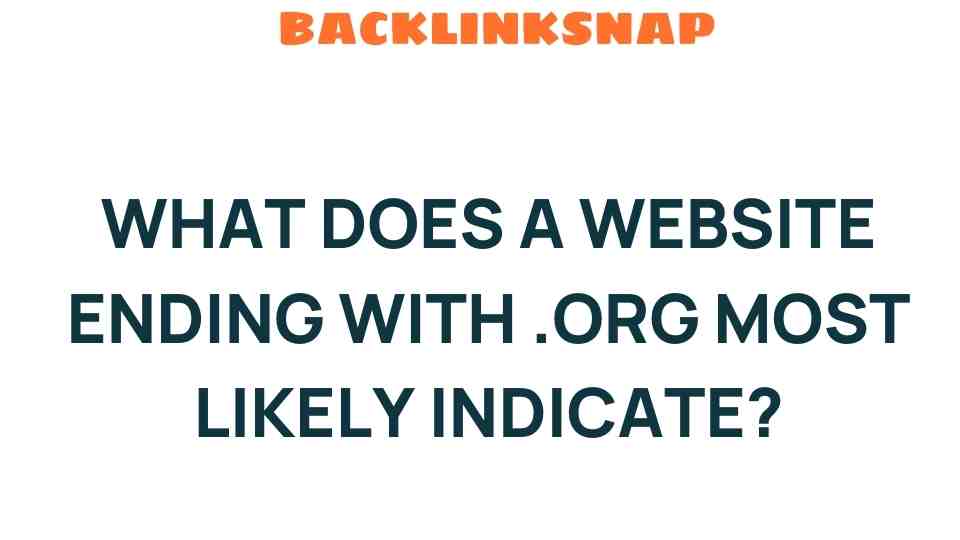What Does a Website Ending with .ORG Reveal About Its Purpose?
When you come across a website that ends with .ORG, you might instinctively associate it with something noble or altruistic. But what does this domain really signify? In a digital landscape filled with various domain endings—like .com, .net, and .edu—the .ORG domain has carved out a unique niche, predominantly used by non-profit organizations, advocacy groups, and educational resources. In this article, we’ll explore the significance of .ORG websites, their credibility, and what they reveal about their purposes.
The Unique Characteristics of .ORG Websites
The .ORG domain, introduced in 1985, was initially intended for non-profit organizations. Over the years, however, its usage has expanded, yet it remains tightly linked to entities that serve public interests. Here are some key characteristics that define .ORG websites:
- Non-Profit Nature: Most .ORG websites are associated with non-profit organizations that aim to promote social causes, education, health, and community initiatives.
- Advocacy and Activism: Many advocacy groups utilize the .ORG domain to champion causes ranging from environmental protection to human rights.
- Educational Resources: Institutions and organizations providing educational resources and community support often use .ORG to signal their commitment to public service.
The Connection Between .ORG Domains and Credibility
One of the most crucial aspects of .ORG websites is their perceived credibility. While not every .ORG site is trustworthy, the domain itself tends to evoke a sense of reliability and honesty. Here’s why:
- Trustworthiness: Users often view .ORG websites as more credible than other domain types, such as .com or .net, which can be used for commercial purposes.
- Transparency: Many .ORG websites provide clear information about their mission, funding sources, and operational practices, which enhances trust.
- Community Engagement: Non-profit organizations often engage with their communities, fostering a sense of connection and accountability that resonates with visitors.
Understanding the Purpose Behind .ORG Websites
So, what exactly do .ORG websites aim to achieve? Let’s break it down:
1. Advocacy Groups
Many .ORG sites are dedicated to advocating for social, environmental, or political issues. These websites serve as platforms for raising awareness, mobilizing support, and educating the public. For example, organizations like Greenpeace use their .ORG domains to promote environmental causes and encourage activism.
2. Community Initiatives
Local non-profits often utilize .ORG domains to promote community initiatives. They provide valuable resources, organize events, and foster community engagement. These websites play a vital role in enhancing local support networks.
3. Educational Resources
Many educational institutions and organizations operate under .ORG domains. They offer free resources, training, and information. For instance, the Khan Academy is a prime example of an educational resource that serves millions of learners worldwide.
How to Assess the Credibility of .ORG Websites
While .ORG websites generally convey a sense of trust, it’s essential to evaluate each site individually. Here are some tips for assessing credibility:
- Check the About Page: A reputable .ORG will have a clear mission statement and information about its leadership and board.
- Look for Contact Information: Legitimate organizations usually provide multiple ways to contact them, including a physical address, phone number, and email.
- Review Financial Transparency: Non-profits should disclose their financials, including funding sources and how donations are used.
- Examine Content Quality: Trustworthy websites usually provide well-researched, accurate, and up-to-date information.
Challenges Faced by .ORG Websites
Despite their credibility, .ORG websites also face unique challenges. Here are a few:
- Funding Constraints: Many non-profit organizations struggle with financial limitations, affecting their ability to maintain and update their websites.
- Information Overload: With the growing number of .ORG sites, users may find it challenging to discern which sources are credible.
- Online Trust Issues: As misinformation spreads online, even .ORG websites must work harder to prove their reliability.
FAQs About .ORG Websites
1. Can anyone register a .ORG domain?
Yes, while .ORG domains are primarily used by non-profit organizations, anyone can register a .ORG domain. However, most reputable sites are linked to non-profit activities.
2. Are .ORG websites always non-profit?
Not necessarily. Although .ORG is commonly associated with non-profit organizations, some for-profit entities may also use this domain.
3. How do I know if a .ORG website is credible?
Evaluate the website’s About page, check for contact information, and review content quality to assess credibility.
4. Are .ORG websites subject to regulation?
Yes, while there’s no strict regulation, .ORG domains are managed by the Public Interest Registry, which aims to uphold the integrity of the domain.
5. Can .ORG websites serve commercial purposes?
While the primary purpose is non-profit, some organizations may engage in commercial activities to support their mission, but this should be clearly stated.
6. What’s the future of .ORG websites?
As the internet evolves, .ORG websites will continue to play a crucial role in providing reliable information and resources for social good, though they must adapt to changing digital landscapes.
Conclusion
In summary, websites ending with .ORG primarily represent non-profit organizations, advocacy groups, and educational resources dedicated to serving public interests. While they generally convey a sense of credibility and trust, it’s essential to evaluate each site individually based on transparency, leadership, and content quality. As the digital world continues to expand, .ORG websites will remain vital for fostering online trust, community engagement, and credible information sharing. Whether you’re seeking educational resources or wanting to support a community initiative, exploring .ORG domains can lead you to valuable and trustworthy content.
This article is in the category Digital Marketing and created by BacklinkSnap Team




